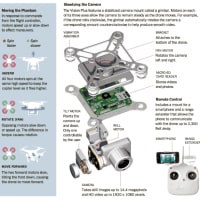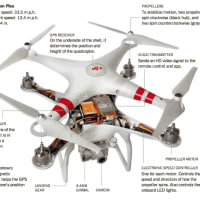Pentagon Strategy Prepares For War In Cyberspace
米国防総省の新戦略サイバースペースの戦争に対処
オープンで攻撃に強いコミュニケーション手段として、米軍で開発されたインターネットが、
オープンだからこそ秘密(クローズド)へのアクセスを容易にしてしまうという皮肉なことに。
by Tom Gjelten
July 15, 2011
The U.S. military can fight on land, in the air, at sea and in space. Now it has a strategy for operations in a new domain: cyberspace.
Under a new plan unveiled Thursday, the Defense Department said it is preparing to treat cyberspace "as an operational domain," with forces specially organized, trained and equipped to deal with cyberthreats and opportunities.
米軍は地上、空中、海上そして宇宙での戦争遂行能力があるが、更に新しいエリアでの作戦のための戦略を持つに至った。そのエリアとはサイバースペース(仮想空間)である。
The strategy presumes that "cyberattacks will be a significant component of any future conflict" and that the United States must be prepared to retaliate, possibly even with military force.
"The United States reserves the right, under the laws of armed conflict, to respond to serious cyberattacks with a proportional and justified military response at the time and place of its choosing," Deputy Defense Secretary William Lynn said.
新戦略はサイバー攻撃があらゆる将来の紛争において、非常に大きな要素になると想定し、米国はこれに対する軍事力の行使も含む報復手段を持たねばならないとしている。
国防副長官ウィリアム・リンは「米国は重大なサイバー攻撃に対して、相応のかつ適正な軍事力を、武力紛争の国際法のもとで、選定した時と攻撃目標に行使する権利を留保する。」と言っている。
A cyberattack on the United States could prompt a military response under the Pentagon guidelines, however, only if it qualified as "an act of war," with effects comparable to those brought about under a traditional "kinetic" or physical attack, and it would be up to the president to make that judgment.
"If there is massive damage, massive human losses [or] significant economic damage, it would be in those circumstances that I think the president would consider all the tools that he has — economic, diplomatic and, as a last resort, military," Lynn said in remarks introducing the new cyberstrategy.
国防総省のガイドラインでは、米国に対するサイバー攻撃は米軍による対抗措置を可能とするが、それは、そのサイバー攻撃が、従来の動的或いは物理的攻撃のもとでもたらされるものと、その被害に関して「戦争行為」と見なされる場合に限るとしており、その判断は合衆国大統領に委ねられる。
「もし、甚大な損害、例えば多数の戦死者や膨大な経済損失を被った場合、大統領は行使しうるあらゆる手段、すなわち経済、外交、そして最終手段としての軍事を対抗策として考慮することになる。」と新しいサイバー戦略を導入するリン副長官は述べた。
Theft Of 24,000 Files 24,000 ファイルの窃盗
The Pentagon plan highlighted efforts by foreign governments to penetrate Defense Department networks and steal sensitive data. In one example cited by Lynn, a foreign intelligence service apparently acquired 24,000 files from a Pentagon contractor in March. "A nation state was behind it," Lynn said, though he would not identify the government.
米国防総省は、同省のネットワークに外国政府が侵入し、重要なデータを盗む行為に焦点をあてて計画を立てている。リン副長官によると外国の情報機関が明らかに3月に24,000ものファイルを軍需関連企業から入手しているという。「その裏には国家の意図がある。」と、その政府を特定はしなかったものの彼は指摘した。
Lynn said other cyberthefts resulted in the loss of sensitive data concerning "aircraft avionics, surveillance technologies, satellite communications systems and network security protocols." Normally, Pentagon officials are far less specific in describing their losses from cybertheft.
リン副長官は、これらの重要データの流失は「航空機の航空電子技術、監視技術、衛生通信システム、ネットワークセキュリティプロトコール」に関するものであると言っている。 これまで、国防総省はサイバー攻撃による盗みの被害について全く具体的に明らかにしてこなかった。
The Pentagon's emphasis on cyberthreats and its warning that cyberattacks could prompt military retaliation has prompted some debate within the U.S. government, with some agencies concerned that a result could be a "militarization" of cyberspace. One of the more controversial aspects of the Pentagon strategy was its official designation of cyberspace as a potential war-fighting domain.
国防総省がサイバー脅威を強調して、サイバー攻撃が軍事報復をもたらすという警告を発することは、サイバースペースを軍事化するのではないか、と連邦政府内のいくつかの部局で物議を起こしている。 国防総省の戦略で、もっとも議論になっている点の一つは、潜在的な戦闘の領域として、サイバースペースをどのように定義するかという点である。
Too Much Focus On War? 戦争に焦点をあてすぎ?
The White House cybersecurity adviser, Howard Schmidt, is among those who have argued that too much attention on war scenarios diverts attention from more pressing cybersecurity challenges and mischaracterizes current cyber intrusions.
"My father was in a war. My son's been in a war. I've been in a war. And this is not what we're going through right now," Schmidt said in a recent interview with NPR.
The Pentagon's new strategy contrasts with cyber agendas pursued in other U.S. government agencies, where the focus is on such issues as Internet commerce and the exchange of information.
ホワイトハウスのサイバーセキュリティ担当顧問のハワード・シュミットは、戦争のシナリオに重点を置きすぎることは、サイバーセキュリティ対策に更に努力を傾注することから目を逸らせてしまい、現在のサイバー侵入を誤って断定する恐れがあるとする人達の一人である。
「私の父は従軍した、私の息子も戦争に赴いた、私もかって戦争に参加した。そして
これは、今我々が経験してきたこととは別のものである。」とNPRの最近のインタビューでシュミットは話している。 国防総省の新しい戦略は連邦政府の他の部局が進めるサイバーアジェンダと対照をなしている。 サイバーアジェンダでは商用インターネットと情報のやりとりにもっぱら焦点を当てている。
"We have to recognize that cyberspace is predominately a civilian space used predominately for civilian purposes," said Christopher Painter, the new cyber policy coordinator at the State Department.
Painter, however, sat in the front row as Pentagon officials introduced their cyber strategy in a presentation at the National Defense University. In an interview, Painter said Internet and cybersecurity policies across the U.S. government need to be coordinated, but that communication across agencies is far better now than it was a few years ago.
「我々は、サイバースペースがもっぱら民間のスペースであり、民間の目的が殆どだということを認識しなければならない。」と国務省の新サイバー政策のコーディネーターであるクリストファー・ペインターは語る。
しかしながら、ペインターは国防総省のサイバー戦略の高官として、国防大学におけるプレゼンテーションでは最前列に座っていた人物でもある。 インタビューに答えて、ペインターは連邦政府の各部署のインターネットとサイバーセキュリティ政策は横断的に調整する必要があるが、現状は数年前に比して格段に良くなったいると指摘する。
Improving Coordination 調整の改善
"You had people who were looking at the economic aspects, you had people looking at the security aspects, [and] you had people looking at the Internet freedom aspects. Those communities seldom talked together," Painter said. "Now that's changing."
「経済の面を見ている人もいれば、セキュリティの面を見ている人もいる、更にはインターネットの自由度を注目している人もいる。 これらの各関心分野の人たちはこれまで相互にあまり話し合うことがなかったが、今は変わりつつある。」と言う。
The State Department and other U.S. agencies will soon introduce their own cyberpolicy plans. Defense officials insist they see no potential conflict with the Pentagon strategy.
"Far from 'militarizing' cyberspace, our strategy of securing networks to deny the benefit of an attack will help dissuade military actors from using cyberspace for hostile purposes," Lynn said. He characterized the Pentagon approach as focused on the improvement of computer defenses, so that an adversary sees less benefit in carrying out an attack.
"If an attack will not have its intended effect, those who wish us harm will have less reason to target us," Lynn said.
国務省と他の連邦部局は彼ら自身のサイバーポリシー計画を発表するが、国防総省の幹部は、彼らは国防戦略における潜在的紛争を考慮していないと批判している。
「サイバースペースを軍事化するのとは全く違い、我々のネットワーク防護戦略は攻撃のメリットを殺すことで、敵が敵対行為の目的でサイバースペースを使用することを思い止まらせることを目指している。」とリン副長官は言う。彼は国防総省のアプローチをコンピューター防御の改善に焦点を当て、敵が攻撃を遂行しても、その効果を減殺するものであると規定している。
「攻撃が、その企図した成果を上げられなければ、我々にそれを仕掛ける敵の動機は小さくなる。」
米国防総省の新戦略サイバースペースの戦争に対処
オープンで攻撃に強いコミュニケーション手段として、米軍で開発されたインターネットが、
オープンだからこそ秘密(クローズド)へのアクセスを容易にしてしまうという皮肉なことに。
by Tom Gjelten
July 15, 2011
The U.S. military can fight on land, in the air, at sea and in space. Now it has a strategy for operations in a new domain: cyberspace.
Under a new plan unveiled Thursday, the Defense Department said it is preparing to treat cyberspace "as an operational domain," with forces specially organized, trained and equipped to deal with cyberthreats and opportunities.
米軍は地上、空中、海上そして宇宙での戦争遂行能力があるが、更に新しいエリアでの作戦のための戦略を持つに至った。そのエリアとはサイバースペース(仮想空間)である。
The strategy presumes that "cyberattacks will be a significant component of any future conflict" and that the United States must be prepared to retaliate, possibly even with military force.
"The United States reserves the right, under the laws of armed conflict, to respond to serious cyberattacks with a proportional and justified military response at the time and place of its choosing," Deputy Defense Secretary William Lynn said.
新戦略はサイバー攻撃があらゆる将来の紛争において、非常に大きな要素になると想定し、米国はこれに対する軍事力の行使も含む報復手段を持たねばならないとしている。
国防副長官ウィリアム・リンは「米国は重大なサイバー攻撃に対して、相応のかつ適正な軍事力を、武力紛争の国際法のもとで、選定した時と攻撃目標に行使する権利を留保する。」と言っている。
A cyberattack on the United States could prompt a military response under the Pentagon guidelines, however, only if it qualified as "an act of war," with effects comparable to those brought about under a traditional "kinetic" or physical attack, and it would be up to the president to make that judgment.
"If there is massive damage, massive human losses [or] significant economic damage, it would be in those circumstances that I think the president would consider all the tools that he has — economic, diplomatic and, as a last resort, military," Lynn said in remarks introducing the new cyberstrategy.
国防総省のガイドラインでは、米国に対するサイバー攻撃は米軍による対抗措置を可能とするが、それは、そのサイバー攻撃が、従来の動的或いは物理的攻撃のもとでもたらされるものと、その被害に関して「戦争行為」と見なされる場合に限るとしており、その判断は合衆国大統領に委ねられる。
「もし、甚大な損害、例えば多数の戦死者や膨大な経済損失を被った場合、大統領は行使しうるあらゆる手段、すなわち経済、外交、そして最終手段としての軍事を対抗策として考慮することになる。」と新しいサイバー戦略を導入するリン副長官は述べた。
Theft Of 24,000 Files 24,000 ファイルの窃盗
The Pentagon plan highlighted efforts by foreign governments to penetrate Defense Department networks and steal sensitive data. In one example cited by Lynn, a foreign intelligence service apparently acquired 24,000 files from a Pentagon contractor in March. "A nation state was behind it," Lynn said, though he would not identify the government.
米国防総省は、同省のネットワークに外国政府が侵入し、重要なデータを盗む行為に焦点をあてて計画を立てている。リン副長官によると外国の情報機関が明らかに3月に24,000ものファイルを軍需関連企業から入手しているという。「その裏には国家の意図がある。」と、その政府を特定はしなかったものの彼は指摘した。
Lynn said other cyberthefts resulted in the loss of sensitive data concerning "aircraft avionics, surveillance technologies, satellite communications systems and network security protocols." Normally, Pentagon officials are far less specific in describing their losses from cybertheft.
リン副長官は、これらの重要データの流失は「航空機の航空電子技術、監視技術、衛生通信システム、ネットワークセキュリティプロトコール」に関するものであると言っている。 これまで、国防総省はサイバー攻撃による盗みの被害について全く具体的に明らかにしてこなかった。
The Pentagon's emphasis on cyberthreats and its warning that cyberattacks could prompt military retaliation has prompted some debate within the U.S. government, with some agencies concerned that a result could be a "militarization" of cyberspace. One of the more controversial aspects of the Pentagon strategy was its official designation of cyberspace as a potential war-fighting domain.
国防総省がサイバー脅威を強調して、サイバー攻撃が軍事報復をもたらすという警告を発することは、サイバースペースを軍事化するのではないか、と連邦政府内のいくつかの部局で物議を起こしている。 国防総省の戦略で、もっとも議論になっている点の一つは、潜在的な戦闘の領域として、サイバースペースをどのように定義するかという点である。
Too Much Focus On War? 戦争に焦点をあてすぎ?
The White House cybersecurity adviser, Howard Schmidt, is among those who have argued that too much attention on war scenarios diverts attention from more pressing cybersecurity challenges and mischaracterizes current cyber intrusions.
"My father was in a war. My son's been in a war. I've been in a war. And this is not what we're going through right now," Schmidt said in a recent interview with NPR.
The Pentagon's new strategy contrasts with cyber agendas pursued in other U.S. government agencies, where the focus is on such issues as Internet commerce and the exchange of information.
ホワイトハウスのサイバーセキュリティ担当顧問のハワード・シュミットは、戦争のシナリオに重点を置きすぎることは、サイバーセキュリティ対策に更に努力を傾注することから目を逸らせてしまい、現在のサイバー侵入を誤って断定する恐れがあるとする人達の一人である。
「私の父は従軍した、私の息子も戦争に赴いた、私もかって戦争に参加した。そして
これは、今我々が経験してきたこととは別のものである。」とNPRの最近のインタビューでシュミットは話している。 国防総省の新しい戦略は連邦政府の他の部局が進めるサイバーアジェンダと対照をなしている。 サイバーアジェンダでは商用インターネットと情報のやりとりにもっぱら焦点を当てている。
"We have to recognize that cyberspace is predominately a civilian space used predominately for civilian purposes," said Christopher Painter, the new cyber policy coordinator at the State Department.
Painter, however, sat in the front row as Pentagon officials introduced their cyber strategy in a presentation at the National Defense University. In an interview, Painter said Internet and cybersecurity policies across the U.S. government need to be coordinated, but that communication across agencies is far better now than it was a few years ago.
「我々は、サイバースペースがもっぱら民間のスペースであり、民間の目的が殆どだということを認識しなければならない。」と国務省の新サイバー政策のコーディネーターであるクリストファー・ペインターは語る。
しかしながら、ペインターは国防総省のサイバー戦略の高官として、国防大学におけるプレゼンテーションでは最前列に座っていた人物でもある。 インタビューに答えて、ペインターは連邦政府の各部署のインターネットとサイバーセキュリティ政策は横断的に調整する必要があるが、現状は数年前に比して格段に良くなったいると指摘する。
Improving Coordination 調整の改善
"You had people who were looking at the economic aspects, you had people looking at the security aspects, [and] you had people looking at the Internet freedom aspects. Those communities seldom talked together," Painter said. "Now that's changing."
「経済の面を見ている人もいれば、セキュリティの面を見ている人もいる、更にはインターネットの自由度を注目している人もいる。 これらの各関心分野の人たちはこれまで相互にあまり話し合うことがなかったが、今は変わりつつある。」と言う。
The State Department and other U.S. agencies will soon introduce their own cyberpolicy plans. Defense officials insist they see no potential conflict with the Pentagon strategy.
"Far from 'militarizing' cyberspace, our strategy of securing networks to deny the benefit of an attack will help dissuade military actors from using cyberspace for hostile purposes," Lynn said. He characterized the Pentagon approach as focused on the improvement of computer defenses, so that an adversary sees less benefit in carrying out an attack.
"If an attack will not have its intended effect, those who wish us harm will have less reason to target us," Lynn said.
国務省と他の連邦部局は彼ら自身のサイバーポリシー計画を発表するが、国防総省の幹部は、彼らは国防戦略における潜在的紛争を考慮していないと批判している。
「サイバースペースを軍事化するのとは全く違い、我々のネットワーク防護戦略は攻撃のメリットを殺すことで、敵が敵対行為の目的でサイバースペースを使用することを思い止まらせることを目指している。」とリン副長官は言う。彼は国防総省のアプローチをコンピューター防御の改善に焦点を当て、敵が攻撃を遂行しても、その効果を減殺するものであると規定している。
「攻撃が、その企図した成果を上げられなければ、我々にそれを仕掛ける敵の動機は小さくなる。」




















※コメント投稿者のブログIDはブログ作成者のみに通知されます